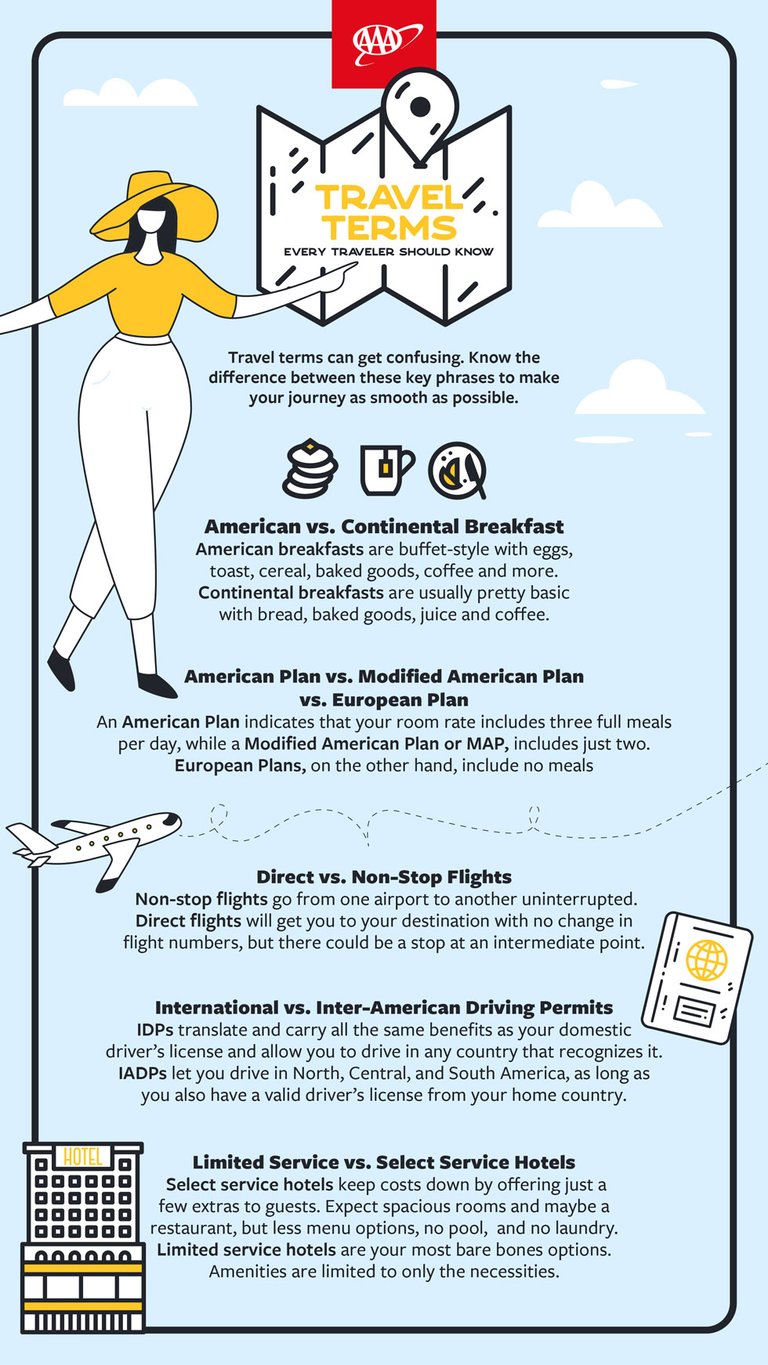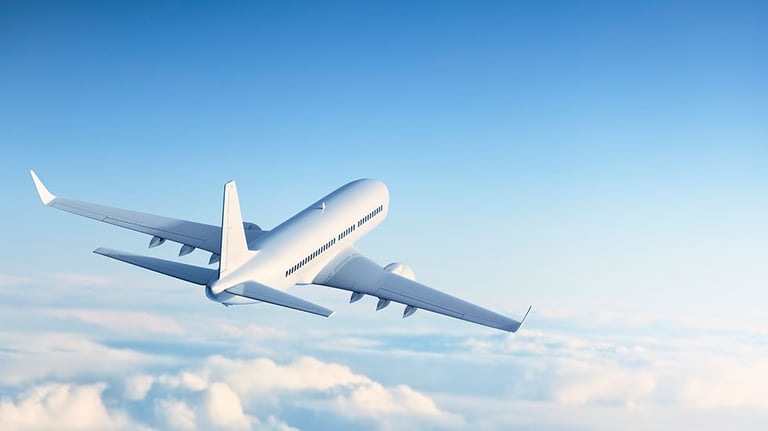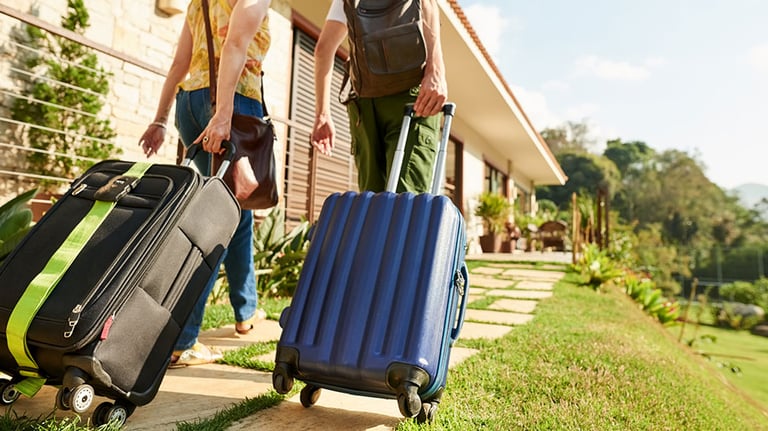
Whether you’re traveling to another state or another country, visiting for one night or several days, there are a number of terms you’ve likely come across when booking vacations, hotels, airfares and other travel accommodations and thought to yourself, “Huh?”
Understanding common travel industry terminology can make booking and planning your trips easier. Here are 12 of the most common travel terms that every traveler should know and be familiar with.

All-inclusive resort
When you stay at an all-inclusive resort, it means your stay, unlimited food, drinks (both alcoholic and non-alcoholic), activities, and entertainment are all included in the booking price of the resort. Sometimes gratuities are also included, so you don’t have to worry about carrying around extra cash.
While some resorts do have extra costs for features such as spa services, most of the time all-inclusive means everything is included. Depending on the resort, free services or access could also include a pool, gym, room service, Wi-Fi, or other amenities.

American breakfast vs. continental breakfast
If you stay overnight at a hotel or resort, you may find a variety of breakfast choices available to you. But how do you know which one to choose? In this case, it depends on how hungry you are.
An American breakfast is typically buffet-style and includes beverages (like juice and coffee), meats, cheeses, cereal, baked goods (like muffins, danishes, bagels, toast, etc.), and other various items.
A continental breakfast is typically much lighter, often consisting of only coffee or juice, and rolls or toast with butter or jam. Other baked goods could be included, but overall, it usually has fewer offerings than a traditional or American-style breakfast.

American Plan, Modified American Plan, and European Plan
Sometimes when you book a hotel in another country, you may be offered a particular system of paying a single daily rate that covers the room and potentially meals.
With the American Plan, sometimes referred to as a Full American Plan, Full Pension or Full Board, the room’s rate includes three full meals per day, per guest.
The Modified American Plan (MAP), also called Half Pension or Demi-Pension, includes the room and two daily meals (typically breakfast and dinner).
The European Plan is a room rate that includes no meals.
Code sharing
When two airlines have a code share agreement, it means they’ve entered into a marketing agreement that allows one airline to sell seats on another airline as their own. For example, if Southwest Airlines had an agreement with another airline, they could sell seats on the other airline with the SW label and flight number.
Code sharing allows airlines to offer flights to destinations they don’t serve, and helps contribute to customer loyalty. Passengers can earn points on a route their favorite airline doesn’t currently offer, which helps them earn frequent flier status.

Direct vs. non-stop flight
When you book a flight with an airline, you may see options for booking a direct flight or a non-stop flight. While these terms are often confused as the same, they are actually different.
A direct flight is a flight between two points with no change in flight numbers, but there could be a stop at an intermediate point. This stop may be to get new passengers, or to allow others to disembark. Or it could be a technical stop. During direct flights, most passengers remain seated on the plane.
Non-stop flights involve no intermediate stops, which means it goes from one airport to another without stopping. If you have a change in flight numbers, the next flight is referred to as a connecting flight.

Guided vacation
Traveling to a new country or city is a breeze with a guided vacation. You can typically book one of these trips through a travel agent or company, who will plan itineraries, group tours, transportation, and hotels for you. You don’t have to worry about the details and the agent will help ensure you don’t miss any of the best sites or activities. You may even be offered private and behind-the-scenes tours or features that most travelers don’t have access to.

Incidental charge
If you use an item or service while staying at a hotel or resort, such as renting a movie, making a phone call, ordering room service, etc., those will be billed to your room after their use as an incidental charge. Most of the time you must provide a credit card at check-in to cover any incidental charges.

International driving permit and inter-American driving permit
If you would like or are planning on driving a vehicle while traveling in a foreign country, you must get an appropriate driving permit to ensure you can legally operate the vehicle.
An international driving permit (IDP), also known as an international driving license (IDL) is a formal document that translates your domestic driver’s license and allows you to drive a vehicle in any country that recognizes the document. IDPs are authorized by your home country’s government, and can be issued by AAA in the U.S. To drive with an IDP or an IDL, you must also have your valid driver’s license issued in your home country.
An inter-American driving permit (IADP) also licenses you to drive a private vehicle in another nation or country, as long as you also have a valid driver’s license from your home country. It’s similar to the IDP, though this license is specific to drivers in North, Central, and South America.

Limited service hotel vs. select service hotel
Limited service hotels are typically considered budget-friendly hotels that offer most accommodations but there may not be a restaurant or other food/beverage components on the premises. They also may or may not have a business center, fitness center, pool, or other amenities. These hotels typically are smaller, the rooms are simpler, and there is typically fewer staff working there.
Select service hotels are similar to limited service hotels, but are less likely to have facilities such as a business center, fitness center, or pool. Without the extensive array of facilities, services and amenities, these hotels are often the most budget-friendly.

Minimum connect time
The minimum connect time (MCT) is the shortest time required in order to successfully transfer from one flight to a connecting flight. If you’re booking flights and will have a connecting flight, it’s recommended to choose a connecting flight that exceeds the minimum connection time.
This time is calculated based on how long it’s estimated to get from the arrival gate of one flight to the departure gate of the following flight, which can range depending on the size of the airport. These times are mandated by the airline industry.
A travel agent will help ensure you book appropriate flights, but if you’re not using an agent, a good rule of thumb is to allow at least 60 to 90 minutes for a U.S. domestic flight, and 90 to 120 minutes for an international connection.

Transfer
A transfer is the transportation a passenger or visitor uses between their point of arrival and hotel or resort, and vice versa. You may have a private transfer, meaning it’s just you and your party, or a public transfer where other passengers may join you. Typically, a transfer is a car, SUV, or bus.

